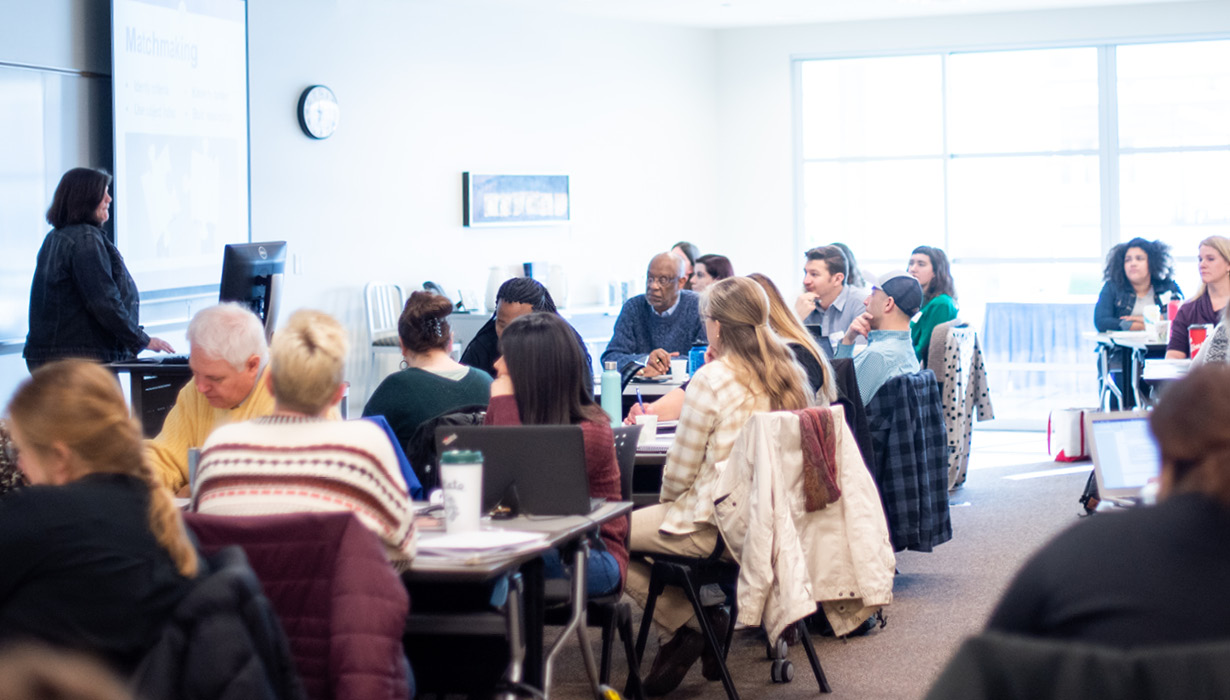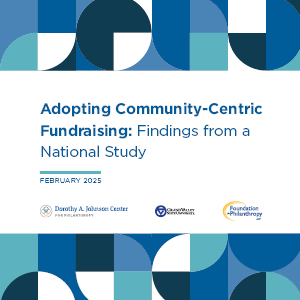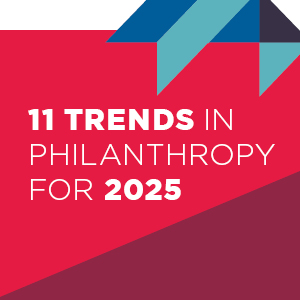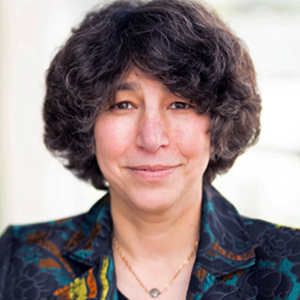
Professional Development

At the Johnson Center, we offer a range of professional learning opportunities designed to strengthen the knowledge, skills, and impact of those working in philanthropy. Grounded in research and informed by practice, our programs support individuals, organizations, and networks in navigating complex challenges, increasing access and opportunity, and building a culture of learning across the sector.
Ways to Learn
We offer a variety of formats and approaches to fit your learning needs.
Public or Private Offerings
Online or In Person
Standard or Custom Curriculum
On Your Timeline
Why Learn With Us?
Our Research-to-Practice Mission
Our professional learning programs build meaningful connections between cutting-edge university research and the real-world achievements and challenges of community change. Grounded in the latest research, theory, and data, our programs equip you with practical tools and insights to strengthen your daily work and rethink the broader systems that shape philanthropy.
The Program Officer Competency Model
Each course is grounded in the Johnson Center’s Program Officer Competency Model©—a rigorously validated, research-based framework that articulates the essential knowledge, skills, and behaviors of effective program staff. By aligning course content with this model, we ensure participants gain practical, highly-relevant skills that reflect the current standards of excellence in philanthropy.
Experience and Expertise
The Johnson Center has provided professional learning programs and resources for grantmakers for over two decades. Our programs are designed and delivered by professionals with deep experience in philanthropy, extensive knowledge of research and learning best practices, and a commitment to valuing what each learner brings to the classroom – including prior knowledge, perspectives, and connections.

Increase your knowledge of the philanthropic sector by learning with and from leaders in the field.
Develop or refresh core grantmaking skills within the context of your foundation’s philosophy.
Limited course sizes ensure the opportunity to collaborate with grantmaking peers and experts.
Uncover the sector’s history, dig in to current trends, and situate your own work and impact.
Virtual Public Courses are Available in Two-Day and Two-Hour Formats
Philanthropy 101
Designed for professionals new to the field or new to their role, Philanthropy 101 grounds you in the basics of foundations, nonprofits, grantmaking, and the field of philanthropy. Participants gain a deeper understanding of what philanthropy is, what makes it distinct from the business and government sectors, and how their own roles fit into the broader field. The course introduces many essential concepts — including ethics, accountability, equity, and power dynamics — along with providing an overview of the fundamentals of grantmaking.
Suggested complementary courses: Grantmaker Ethics & Accountability
Proposal Analysis in Grantmaking
Participants in this course explore how the processes of proposal solicitation and analysis can set the stage to build capacity, foster meaningful relationships, advance equity, and authentically share power — all within the context of a foundation’s overall mission and grantmaking philosophy. This course is equally valuable for program officers new to the role, or veterans looking to refine their process.
Suggested complementary courses: Site Visit Essentials for Grantmakers, Grantmaker Risk Management
Financial Analysis for Grantmakers
Dive into the fundamentals of grant proposal financial review and analysis — including organization and project budgets, financial statements, audits, and the IRS Form 990/990EZ — with an emphasis on centering equity in practice. Participants practice reviewing and analyzing real-life financials to prepare them for financial analysis in their daily roles. This course content is regularly updated to account for changes in FASB regulations and the financial implications of current events.
Suggested complementary courses: Beginner’s Guide to Reading Form 990, Intermediate Guide to Reading Form 990
Professional Writing for Grantmakers
Whether preparing a grant recommendation for the board, developing a strategy document to share with stakeholders, or drafting blog posts, writing persuasively is an essential component of a grantmaker’s role. This interactive, group-coaching experience focuses on sharpening the analytical skills that are the basis for good writing. Participants bring their own writing samples and put new skills into practice with our grantmaking experts, with additional time to focus on individual foundations’ unique requirements.
Suggested complementary course: Proposal Analysis for Grantmakers
Grantmaker Ethics & Accountability
Ideal for foundation staff, donors, and others engaged in grantmaking, this program provides practical tools and step-by-step guidance to help you navigate ethical challenges in grantmaking.
Site Visit Essentials for Grantmakers
Learn how innovative site visit methods can help balance power dynamics and establish more authentic relationships, enabling grantees to showcase their strengths within their authentic context.
Grantmaker Risk Management
This course from the Johnson Center explores a trust-based, risk-tolerance/management framework that both honors the grantee partnership and leads to increased impact.
Beginner’s Guide to Reading the Form 990
This course is designed to ground you in the basics of Form 990 — including practical and purposeful ways to leverage information from a 990 with a nonprofit, financial, or foundation lens.
Intermediate Guide to Reading the Form 990
This interactive, virtual course will help funders and nonprofit professionals better understand the funding perspective and how to use 990s as a tool to assess organizational or collective impact.
The Program Officer Competency Model
Our competency model for foundation program officers — rigorously validated by fieldwide experts — maps the knowledge, skills, and behaviors of successful program staff. These competencies form the bedrock of our professional development courses.
Cross-Cutting Competencies
Relationships & Field Building
Proposals & Due Diligence
Strategy, Evaluation, and Learning

The Johnson Center’s Special Topics courses are designed to meet the evolving needs of philanthropy and nonprofits. Offered through private delivery, these courses provide flexible, timely learning opportunities tailored to the unique challenges and priorities facing today’s practitioners.
Each course is grounded in research, case studies, and real-world examples—ensuring that participants gain practical insights they can apply immediately in their work.
Especially ideal for place-based networks and grantmakers seeking to offer professional development to a broad group of grantees, these courses support collective learning and capacity building at scale. Availability rotates over time to reflect the shifting needs of the sector, ensuring that content remains relevant, responsive, and impactful.
Interested in bringing one of these courses to your community—virtually or in person? We invite you to reach out to explore how we can provide a Special Topics course that meets your organization’s goals.
Not seeing a course that fits your needs? Contact us about developing and delivering a new program for your audience.
Scenario Planning
New Realities for Nonprofit Communications and Advocacy
A Disaster Simulation: Response, Recovery & Resilience
Public Offering of “A Disaster Simulation”
The Johnson Center is currently offering a special public version of “A Disaster Simulation” to complement the publication of a related article in The Foundation Review. We invite all interest grantmakers and community leaders to participate!
Wednesday, October 8 // 12:30-4:30p.m. // Online
THE FOUNDATION REVIEW
Go Deeper: Are Community Philanthropic Organizations Planning for Climate Change?

Conversations that Matter
The Johnson Center hosts a range of virtual and in-person programs. Whenever possible, we record our programs to make them available for the larger field.
Research in Focus
Dialogues & Big Ideas
Live Events
From The Foundation Review
Playlists Available on YouTube
Major Trends in Philanthropy
In this series, expert practitioners and researchers in philanthropy engage with the Johnson Center’s annual 11 Trends in Philanthropy report. These recorded webinars explore the key forces shaping the sector—offering analysis, real-world context, and actionable insights. Whether you’re tracking emerging developments or planning for the future, these conversations provide a deeper understanding of the trends influencing philanthropic practice today and how they interact with and shape one another.
Past, Present, and Future: 30th Anniversary Celebration Series
How has philanthropy changed in the past 30 years? How might it be different 30 years from now? This three-part series celebrating the Johnson Center’s 30th Anniversary in 2022-2023 explores the past, present, and possible future of our sector as we experience ebbs and flows, experiment with new models for achieving impact, and place our national sector in its global context.
The Foundation Review: 15th Anniversary Celebration
The Foundation Review celebrated its 15th anniversary in 2024 with two special anniversary issues and a collection of author videos. Here from authors, editors, and journal champions to learn more about the journal’s impact, reach, and role in the philanthropic sector.
The Foundation Review: Webinars
The Foundation Review, the Johnson Center’s peer-reviewed journal of philanthropy, publishes three issues per year. Some issues are unthemed, while others focus on a specific topic such as Impact Investing, Community Leadership and the Sustainable Development Goals, or Global Philanthropy. Many issues are accompanied by webinars featuring authors and their partners, digging more deeply into the frameworks, case studies, and big ideas shared in each article. Catch each webinar and explore the full archive of The Foundation Review, all available via Digital Open Access.
The Foundation Review: Author Videos
Article authors and partners often record brief introductory videos to share more context, insights, and information for readers before they dive into the text. In this playlist, meet your favorite authors, find new peers to connect to, and discover the full range of topics and subject matter expertise available in the journal.
Evaluation and Impact Investing
Designed to engage evaluators and impact investors on the opportunities for using evaluative thinking in social finance and impact investing, this series focuses on the three program phases — planning, implementation, and recalibration — and how evaluators can use their skills in each phase. This series was cohosted by the Johnson Center with the American Evaluation Association, the Council of Michigan Foundations, and Mission Investors Exchange.
Summit Replay: Donor Journeys
From 2011-2019, the Johnson Center’s Frey Foundation Chair for Family Philanthropy hosted a biennial National Summit on Family Philanthropy. In 2019, the summit focused on the theme “Our Donor Journeys and Why They Matter.” The program featured three panel conversations: Partners on the Giving Journey, Journeys After Trauma, and Next Gen Social Justice Journeys. Each dialogue was recorded and is shared here in a four-part playlist, including an introduction from Founding Frey Chair Michael Moody, Ph.D.













